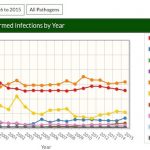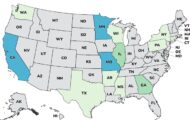In a rather unusual outbreak, public health officials have identified 24 people in 16 states sickened with Salmonella Typhimurium infections linked to teaching and clinical laboratories. Six of those sickened have been hospitalized. No deaths have been reported. This is the same strain that was associated with infections linked to microbiology lab exposure in 2011 and 2014. This is a public health problem and a reminder that bacteria used in microbiology laboratories can sicken people who work in those labs. [Editor's note: The first time I was in a microbiology lab the professor warned us against eating or drinking in the room and also walked us through safety steps, including frequent hand washing and the use of gloves, lab coats, and goggles.] In addition, people who live with … [Read more...]
Trichinellosis Outbreaks in Alaska Linked to Walrus Meat
Many older people can recall their moms cooking pork to well done (or more) because of the fear of trichinellosis. Pigs used to be fed scraps, or they foraged for their food, so their meat was infected with a microscopic parasite called Trichinella. A few thousand cases occur every year around the world. In the United States, the USDA has reduced the recommended internal temperature for pork to 145°F from 160°F, since pork is no longer likely to be contaminated with the parasite. Cases have greatly declined in this country since the 1950s. But the disease is making a comeback among people who eat walrus meat. Two trichinellosis outbreaks in Alaska linked to walrus meat are the subject of a report in the CDC's Morbidity and Mortality Weekly Report for July 7, 2017. This illness … [Read more...]
Salmonella Outbreak in 2016 Linked to Hot Peppers
A multistate outbreak of Salmonella Anatum infections that were linked to imported hot peppers appears in the The Morbidity and Mortality Weekly Report for June 30, 2017. This is the first government report on this outbreak. Thirty two people in nine states were sickened in this outbreak that happened during the summer of 2016. The CDC and FDA did not publish anything about this outbreak at the time because government officials couldn't find a source for the outbreak, specifically a common source for the peppers, so consumers couldn't take steps to protect themselves. Epidemiologic, lab, and traceback evidence found that fresh hot peppers were the likely source, but "a single pepper type or source farm could not be identified." Fresh hot peppers and other produce have been the … [Read more...]
FDA Releases List of Facilities that Served Hepatitis A Positive Tuna
The FDA has released a list of facilities that served frozen raw ahi tuna cubes that were recalled for possible hepatitis A contamination. In their investigation report they have added a table that includes the names and addresses of the 31 restaurants and stores that sold the product in California, Texas, and Oklahoma. This product was recalled twice. The first recall was in Hawaii only. The product is imported raw frozen ahi tuna cubes sourced from PT Deho Canning Co. in Indonesia, sold under Tropic Fish with lot codes 609149 and 609187. The current recall, which was issued on May 18, 2017 [editor's note: we cannot find this recall on any FDA page], is for frozen yellowfin tuna steaks from Sustainable Seafood Company and yellowfin tuna cubes from Santa Cruz Seafood. This recall by … [Read more...]
CDC Study Looks at Restaurant Food Allergy Practices
As part of the Morbidity and Mortality Weekly Report for the week of April 21, 2017, the Centers for Disease Control and Prevention (CDC) has published a study about food allergy practices in restaurants across the country. Food allergies affect about 15,000,000 people in this country and cause about 30,000 emergency department visits and 150 to 200 deaths every year. Almost half of the fatal food allergy reactions over a 13 year period were caused by food from a restaurant or other food service establishment. The report found that fewer than half of members of the restaurant staffs surveyed in 278 restaurants had received training on food allergies. And although most restaurants list ingredients or recipes for some menu items, few have separate equipment or areas that are designed … [Read more...]
CDC Releases Data on Foodborne Illnesses and CIDTs 2013 – 2016
In the latest issue of CDC's Morbidity and Mortality Weekly Report, a report studied the incidence and trends of infections of foodborne pathogens from 2013 - 2016. The report also looked at the effect of the increasing use of culture-independent diagnostic tests (CIDTs) on pathogen surveillance. Overall, the 2016 incidence of confirmed Campylobacter infections was lower in the United States, but incidences of confirmed Shiga toxin-producing E. coli (STEC), Yersinia, and Cryptosporidium infections were higher. But the report states that culture-independent diagnostics tests (CIDTs) are complicating this data, because testing for pathogens may be occurring more frequently using this method. In 2016, FoodNet, the CDC's Foodborne Diseases Active Surveillance Network, identified … [Read more...]
Outbreaks Linked to Imported Foods Are Increasing
A study published in the March edition of the CDC's Emerging Infectious Diseases reveals that more Americans are being sickened by imported food. The study's authors state that "a small but increasing number of foodborne disease outbreaks [are] associated with imported foods, most commonly fish and produce. New outbreak investigation tools and federal regulatory authority are key to maintaining food safety." About 19% of the food we eat in this country is imported. About 97% of the fish and shellfish we consume, 50% of fresh fruits, and 20% of fresh vegetables come from other countries. This proportion has steadily increased over the past 20 years because consumers want to eat produce out of season and want a wider selection of products. A food poisoning outbreak is two or more … [Read more...]
CDC Releases Final Report on Winnable Battles Program
The Centers for Disease Control and Prevention (CDC) has released the final report on the Winnable Battles program, which is an effort to make the biggest health impact for the most Americans in the shortest time. The program tackled seven threats to public health where they believed they could make an immediate impact: Tobacco; Nutrition, Physical Activity and Obesity; Food Safety; Healthcare-Associated Infections; Motor Vehicle Safety; Teen Pregnancy; and HIV. The project was launched in 2010. Progress on some of these fronts were significant. But the battle against food poisoning yielded mixed results. In food safety, illnesses caused by some pathogens decreased significantly, while others have kept increasing. Every year, 1 in 6 Americans gets sick by eating contaminated food … [Read more...]
CDC Develops FoodNet Fast For Consumers to Track Outbreaks
The Centers for Disease Control and Prevention (CDC) has developed an interactive online program so consumers can track foodborne illness outbreaks over a 20 year period. The tool is called FoodNet Fast. The database includes confirmed cases of infection reported to FoodNet, which is the CDC's Foodborne Disease Active Surveillance Network. It includes outbreaks from 1996 through 2015. People can search by year, pathogen, age group, sex, and race. To develop the database, officials used surveillance from FoodNet in 10 sites for infections of nine pathogens that are commonly transmitted through food, and also for hemolytic uremic syndrome, a complication of E. coli infections that can cause kidney failure. The database also tracks how the rates of illness for Campylobacter, … [Read more...]














